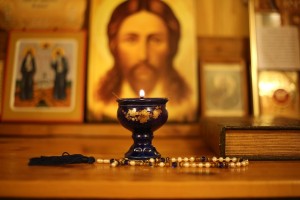
The only thing worse than watching Tommy Wiseau’s heartbreaking work of staggering genius The Room, my husband says, is watching The Room while extremely hungover, which he did one miserable afternoon after a party in college. But there is something worse than watching The Room while hungover, and it’s reading Rod Dreher’s The Benedict Option stone cold sober. It’s a truly baffling work, one part extended blog post, one part tone-deaf culture war manifesto, and all parts an embarrassing display of a writer high as a kite on his own supply. But these critiques of The Benedict Option have long-since been insightfully (and much more charitably) explored by the likes of Sam Rocha at Patheos and Emma Green in The Atlantic.
What I’m more interested in, is meditating on The Benedict Option as a document written by an Eastern Orthodox Christian, which Dreher nominally is. He was raised Methodist before converting to Roman Catholicism in 1993. Then, in 2006, disillusioned by sex abuse scandals in the Catholic Church which he believes were facilitated by a Vatican cabal of gay priests known as “The Lavender Mafia,” Dreher converted to Eastern Orthodoxy. Bully for him. Since around that time, Dreher had been kicking up the idea of Christian removal from corrupt postmodern society that would eventually ignite in the virtue-signaling, isolationist tire fire of The Benedict Option.
As strange a document as The Benedict Option seems to people of different faiths or none at all who have read it, it gets even weirder when read by an Orthodox Christian with the knowledge that the writer, too, is Orthodox. It’s a book written by a Christian to Christians seemingly untouched by the author’s denomination’s theology—I was on the point of saying “the author’s own theology,” but there’s plenty of that in there. That’s the problem. It’s 90% Rod Dreher’s vision of Benedictine LARP, 10% Latin rad trad/alt right obsession with the state of “Western civilization” and 0% authentic Orthodox theology. Maybe one of the most unintentionally revealing and even slightly heartbreaking moments of the book is when Dreher mentions the Jesus Prayer, which his priest assigned him as a prayer rule. The reason? To, Dreher says, “get [me] out of [my] own head.”
It doesn’t seem to have worked.
The very idea of running for the hills, fleeing from postmodernism and The Gay Agenda™, is antithetical to the Orthodox ethos. Dreher is undeniably enamored with the eremitical life, which the Orthodox Church has always regarded with deep reverence and respect. That fatal attraction to all things eremitic is the driving force behind Dreher’s whole manifesto; he devotes nearly a whole chapter to gushing over his visit to the Monastery of St. Benedict in Norcia and the life-changing impact it had on him. He speculates glowingly about what drove St. Benedict to become a hermit, and speaks enviously of the saint’s great escape from the crumbling Western arm of the Roman Empire. But there’s the catch: in all this glowy romance with an idealized past, Dreher misunderstands (or just plain ignores) the whole point of eremitic life. Escape is not and never was the raison d’être for St. Benedict or St. Anthony or the Desert Fathers. Perhaps it’s part of what led them into the desert, but it’s not why they stayed, and it’s not the Orthodox understanding of monasticism. The Orthodox monastic does not run and hide from the world in disgust. She gives up her life and retires in solitude to pray for the entire world out of love.
It’s this fundamental misunderstanding that makes The Benedict Option such a monumental embarrassment and imminent failure. Dreher’s entire system of Christian removal from the world to ensure the survival of “Christendom” or “Western civilization” or whatever it is he’s worshiping under the guise of Orthodoxy is predicated on the vision of monastic solitude as escape. Escape from the gays that want to assimilate our children, escape from the tyranny of post-Obergefell America, escape from the martyrdom of living among people who aren’t exactly like Rod Dreher. But as Benedict and the other early pioneers of the monastic life whom Orthodoxy loves and celebrates learned very quickly in the desert: there is no escape. “The world” isn’t a physical place out there where lesbians have the audacity to hold hands on the street, or postmodernist liberal professors meet in smoky dark rooms to plot the final downfall of Christianity over scotch. Orthodox wisdom has long held that the world is a state of the heart that everyone chooses to carry with them: according to St. Macarius, himself a desert hermit, the heart contains “poisonous beasts and all the treasures of evil.” It doesn’t matter where you are—a Baton Rouge suburb, or a Gilead-like compound in the woods. You will not be able to escape the treasures of evil within yourself or within your neighbors in the bunker, not until you learn to, in the words of St. Isaac the Syrian (another lover of solitude) burn with love and mercy for the whole of creation, “for humanity, for the birds, for the animals, for demons, and for all that exists.” All. Scary non-Christians and postmodern philosophers and gender non-conforming people included.
The hardest thing in this world is to live in it. Existing alongside people who live differently than you is hard. Imagining such people complexly and loving them is even harder. The Orthodox tradition calls us not to take the easy out and flee from them, but to be brave, to stay right where we are and affirm that they are indisputably our brothers and sisters. We are not called to love “the West” or even the Church as we know it. We are commanded to love living and breathing human beings, every single one, without exception, wherever we are, right now.
Escape and retreat are not options.
Kassia is a freelance writer who lives in Florida with her husband, Chris. She enjoys Eastern patristics, Stoic philosophy, and cheap white zin by the jug.
(Image via Pixabay.)













